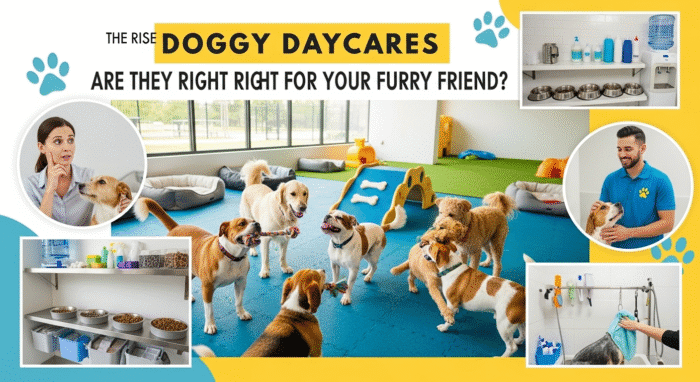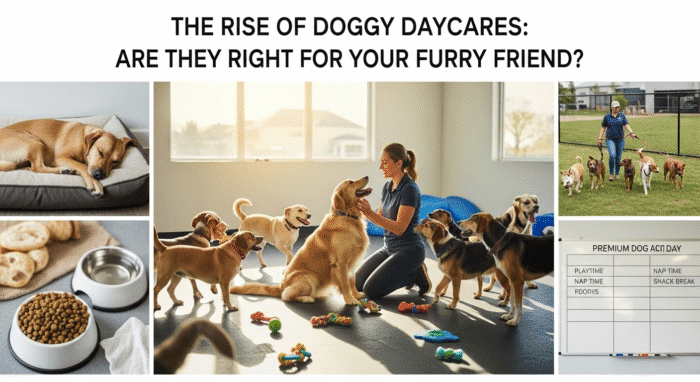Okay, so I’ve got to admit, I was skeptical. Doggy daycare? Seemed a little… extra. Like, isn’t a walk enough? A chew toy? But then I started noticing them everywhere. And, more importantly, my own pup, Gus (a goofy, lovable mutt), was starting to look… bored. Not depressed, mind you, just… unfulfilled. You know that look.
The truth is, my work-from-home lifestyle, while great for avoiding rush-hour traffic, wasn’t exactly stimulating for a dog who craves interaction. Walks are good, sure. But they’re hardly a replacement for a proper romp with other canine crazies. I initially thought it was a sign he needed more exercise, but even upping our walk time didn’t fully scratch that itch. Turns out, what he really needed was socialization. The American Kennel Club highlights the importance of socialization for dogs, especially when they’re puppies. But what about the older pups? The ones who missed the socialization boat when they were younger?
Table of Contents
The Appeal of Doggy Daycare: More Than Just Playtime

Here’s the thing: doggy daycare isn’t just about letting your dog run around like a maniac (though that’s definitely part of it!). A good daycare is structured. It’s supervised. It’s a chance for your dog to learn valuable social skills, burn off energy, and, frankly, avoid destroying your furniture out of sheer boredom. Think of it as kindergarten for canines. You might be wondering if this is the right solution for you. The rise of doggy daycares is related to how many pet parents, like myself, want the best for their fur babies.
And it’s definitely a rise. Seriously, they’re popping up faster than coffee shops these days. Which, considering my caffeine intake, is saying something. But with so many options, how do you even begin to choose? What makes one daycare better than another? Well, that’s what I started digging into. And I’ve got to admit, what I found was pretty interesting.
Finding the Right Fit: What to Look for in a Daycare
This is crucial. You can’t just drop your dog off at the first place you see with a sign out front. It’s like choosing a babysitter for your kid – you need to do your homework. Here’s what I learned to look for:
- Staff-to-Dog Ratio: This is huge. How many dogs are being supervised by each staff member? A lower ratio means more individual attention and a better chance of preventing scuffles. Ideally, you’re looking for something around 1:10 or even lower for smaller dogs or dogs with special needs.
- Cleanliness: Obvious, right? But seriously, take a good look around. Is the facility clean and well-maintained? Are they using appropriate cleaning products? A smelly daycare is a breeding ground for bacteria. No thanks.
- Temperament Testing: A reputable daycare will evaluate each dog’s temperament before accepting them. They need to make sure your dog plays well with others and isn’t going to be a bully (or get bullied).
- Safety Protocols: What happens if there’s an emergency? Do they have a plan in place for handling injuries or illnesses? What about fire safety? It might seem like overkill, but it’s better to be safe than sorry.
- Vaccination Requirements: A good daycare will require all dogs to be up-to-date on their vaccinations. This protects everyone.
But beyond the basics, pay attention to the vibe. Does the staff seem genuinely caring and engaged with the dogs? Are the dogs happy and relaxed? Trust your gut. If something feels off, it probably is.
Oh, and speaking of travel, make sure your dog has all their paperwork in order. This includes any required vaccinations or travel certificates. Check out Dog-Friendly Travel Destinations: Adventures With Your Pooch.
Beyond Daycare: Other Options to Consider
Okay, so maybe daycare isn’t the right fit for your furry friend. That’s totally fine! There are plenty of other options out there. Dog walkers are a great way to get your dog some exercise and a change of scenery. Puzzle toys can help keep them mentally stimulated. And, of course, there’s always the good old-fashioned dog park (though, proceed with caution – not all dogs are park dogs!). Remember, you want the best for your friend, so choosing the right option will bring the best results.
Actually, that’s not quite right… I forgot the most important thing: your dog’s personality. Some dogs are social butterflies who thrive in a pack. Others are introverts who prefer the company of their humans. Understanding your dog’s individual needs and preferences is key to finding the right fit. You know, it’s so much like having kids. You gotta do what’s best for them.
Doggy Daycares, like any other service, come with a cost, but if you are looking to have a dog on a budget, be sure to do your research and check out The Rise of the Dog Parent: How Millennial Lifestyles Are Shaping Pet Care.
FAQ: Doggy Daycare Doubts, Answered
How do I know if my dog is a good fit for daycare?
This is a fantastic question! The best way to determine this is through an evaluation at the daycare itself. Reputable daycares will assess your dog’s temperament, social skills, and comfort level around other dogs. They’ll look for signs of aggression, anxiety, or excessive shyness. Even if your dog seems friendly at home, the daycare environment can be overwhelming for some. Consider your dog’s overall personality. Are they generally comfortable around new dogs and people? Or are they more reserved? And remember, even if your dog isn’t a perfect fit right away, some daycares offer training programs to help them adjust.
What if my dog is anxious or nervous around other dogs?
This is a common concern! Start slow. Maybe try a short trial visit to see how your dog reacts. Talk to the daycare staff about your dog’s anxiety and ask about their strategies for helping anxious dogs feel comfortable. Some daycares have separate play areas for smaller or more timid dogs. Others use calming aids like pheromone diffusers or calming music. If your dog’s anxiety is severe, you might want to consult with a veterinarian or certified dog trainer. They can help you develop a plan to address your dog’s anxiety and potentially prepare them for daycare in the future. It might not be a good fit, but there are options.
Isn’t doggy daycare just a breeding ground for germs and illnesses?
Okay, this is a legitimate concern. Yes, dogs are like kids. And, just like kids, they can pick up germs and illnesses in group settings. However, a reputable daycare will take steps to minimize the risk. They’ll require all dogs to be up-to-date on their vaccinations, regularly clean and disinfect the facility, and have protocols in place for isolating sick dogs. Ask about their health and safety policies. Don’t be afraid to ask questions. And, of course, keep an eye on your dog for any signs of illness after they attend daycare.
How much does doggy daycare typically cost?
The cost of doggy daycare varies depending on location, services offered, and the size of your dog. You can expect to pay anywhere from $25 to $50 per day. Many daycares also offer package deals or monthly memberships, which can save you money if you plan to use the service regularly. Consider it as an investment in the health and happiness of your fur baby.
So, is doggy daycare right for your furry friend? It’s a deeply personal question, and there is no objective answer. But if you’re looking for a way to provide your dog with socialization, exercise, and mental stimulation, it might just be worth a try. Just remember to do your research, choose a reputable daycare, and listen to your gut. And, most importantly, listen to your dog. They’ll let you know what they think, one way or another.

